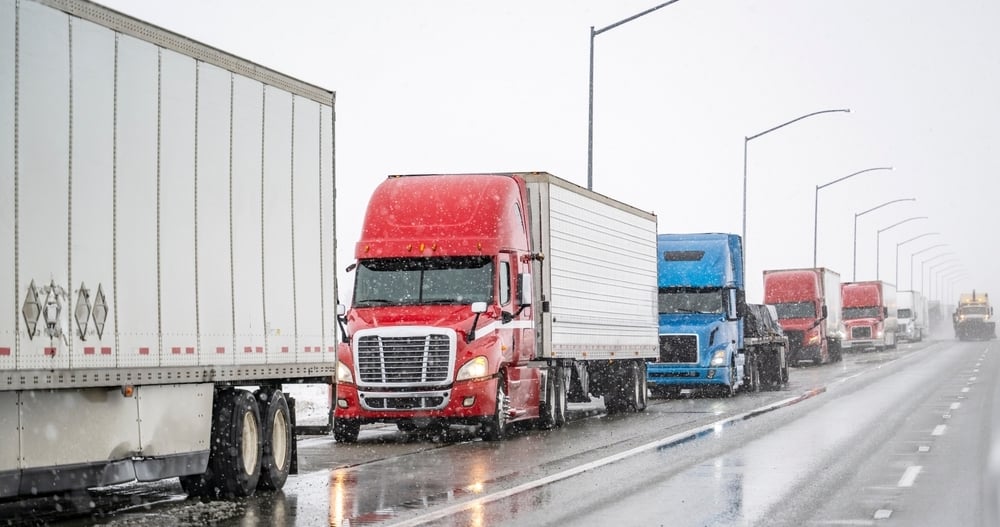Improving Road Safety: Preventative Measures to Adopt w/ LTL Carriers
As the roads continue to be bustling with activity, the need for robust safety measures for Less Than Truckload (LTL) carriers has never been more critical. Preventative strategies can save lives, enhance operational efficiency, and reduce costly damages.
This article will discuss various preventative measures shipping companies can adopt to improve road safety and protect their LTL carriers, assets, and the general public.
The Importance of Road Safety for LTL Carriers

As a vital component of the transportation industry, Less-than-Truckload (LTL) carriers play a significant role in ensuring goods are transported safely and efficiently.
This heavy reliance on LTL shipping involves prioritizing road safety to protect drivers, vehicles, and the transported goods. Failure to do so can lead to accidents, delays, and financial losses for shippers and their over-the-road LTL operators.
Understanding the Risks of LTL Carriers on the Road

Less-than-truckload (LTL) carriers play a crucial role in the transportation industry, moving smaller shipments to various destinations. However, LTL carriers come with their own set of risks on the road. To improve road safety, it's essential to understand these risks and implement preventative measures.
1) Driver Fatigue and Distraction
One of the most significant risks of LTL carriers is driver fatigue and distraction. Large trucks accounted for 9 percent of all vehicles involved in fatal crashes. As drivers often work long hours and cover vast distances, they are more prone to drowsiness and losing focus on the road.
This can result in accidents, putting the driver and other road users at risk.
2) Inadequate Vehicle Maintenance
Proper vehicle maintenance is crucial for the safe operation of LTL carriers. Inadequate vehicle care can lead to issues such as brake failure, tire blowouts, and engine malfunctions.
These problems can cause accidents and pose a risk to other drivers on the road.
3) Improper Cargo Loading
If the cargo isn't loaded correctly, it can shift during transit, potentially causing the truck to become unstable and difficult to control.
This can also result in accidents, especially when navigating tight turns or sudden stops.
Key Preventative Measures to Implement with LTL Carriers

1) Implementing Advanced Driver Assistance Systems (ADAS)
One of the most effective ways to improve road safety for LTL carriers is by equipping vehicles with advanced driver assistance systems (ADAS). T
These technologies, including lane departure warnings, forward-collision warnings, and automatic emergency braking, can significantly reduce the risk of accidents by alerting drivers to potential hazards and even taking preventive actions when necessary.
2) Regular Vehicle Maintenance and Inspection
Proper vehicle maintenance and inspection procedures are essential to ensuring the safe operation of LTL carriers. Routine checks of vital components such as brakes, tires, and lighting systems can help identify and address potential issues before they become dangerous.
In addition, carriers should adhere to the regulations governing vehicle inspection and maintenance, ensuring a high standard of roadworthiness.
3) Driver Training and Safety Programs
Investing in ongoing driver training and safety programs is another crucial aspect of improving road safety for LTL carriers. Drivers should be well-versed in defensive driving techniques, fatigue management, and cargo securement procedures.
Additionally, carriers can benefit from implementing safety incentive programs to encourage drivers to prioritize safe driving practices and maintain a strong safety culture within the company.
The Effectiveness of Regulatory Intervention on LTL Carriers' Safety

Regulatory intervention plays a crucial role in enhancing the safety of LTL carriers, especially when it comes to reducing the risk of accidents and ensuring compliance with industry standards.
Implementing strict regulations and policies is essential in promoting a culture of safety within the LTL carrier industry, and it has proved to be quite effective over the years.
1) Enhanced Inspection and Compliance Standards
One of the critical aspects of regulatory intervention in LTL carriers' safety is the introduction of enhanced inspection and compliance standards. These standards, such as the Compliance, Safety, and Accountability (CSA) program, aid in identifying high-risk carriers and holding them accountable for safety performance.
This targeted approach enables regulators to focus on carriers with the most significant safety concerns, ultimately improving overall road safety.
2) Driver Training and Qualification
Regulations concerning driver training and qualification also contribute significantly to LTL carriers' safety. These rules ensure drivers possess the necessary skills and knowledge to operate their vehicles safely and responsibly.
Mandatory training programs, such as the Entry-Level Driver Training (ELDT) rule, establish minimum training requirements for new drivers to promote higher safety standards and reduce the risk of accidents.
3) Hours of Service Regulations
Another effective regulatory measure is implementing hours of service (HOS) regulations to reduce driver fatigue, a leading cause of accidents in the LTL carrier industry.
By limiting the number of hours a driver can work consecutively and mandating rest breaks, these regulations ensure that drivers remain alert and focused while on the road, ultimately contributing to improved safety.
Regulatory intervention has a significant impact on improving the safety of LTL carriers. Enhanced inspection and compliance standards, driver training and qualification requirements, and hours of service regulations all contribute to a safer environment for both drivers and the general public.
Carriers must stay up-to-date with these regulations and continuously strive to maintain a safety culture.
How Cargobot Improves LTL Carrier and Shipment Safety & Efficiency
![]()
Regarding LTL carrier and shipment safety, Cargobot is an industry leader. The platform works tirelessly to enhance security and efficiency for shippers and carriers. Cargobot has become a vital partner in the logistics industry by implementing cutting-edge technology and innovative solutions.
1) Real-Time Visibility and Tracking
One of the key features of Cargobot's platform is its real-time visibility and tracking capabilities. This allows shippers and carriers to monitor shipments throughout the entire process, ensuring that cargo is transported safely and efficiently.
With instant access to this data, potential issues can be identified and addressed before they become problematic.
2) Smart Matching and Pricing
Another advantage of using Cargobot is its intelligent matching and pricing system. This feature enables shippers to find the best carrier for their needs while carriers can maximize their capacity utilization.
By connecting the proper shipment with the suitable carrier, the platform helps to reduce the number of empty miles traveled, resulting in a safer and more efficient transportation process.
3) Stringent Carrier Selection and Monitoring
Cargobot understands that safety is of utmost importance in the logistics industry. That's why they have a strict carrier selection process, ensuring that only the most reliable and safety-conscious carriers are in their network.
Furthermore, Cargobot continuously monitors carrier certifications, ensuring safety expectations are maintained and improved over time.
The Key Takeaway
It's clear that improving road safety is a top priority for shippers and LTL carriers, and implementing preventative measures is the key to achieving this goal.
By focusing on driver training, smart technology, and proactive maintenance, LTL carriers can ensure the safe and efficient transportation of goods for their customers.
Start an LTL Quote With Cargobot Today

Prioritizing road safety for LTL carriers is crucial for ensuring the well-being of drivers, protecting assets, and promoting overall public safety.
Businesses can significantly improve road safety and mitigate potential accidents and damages by understanding the risks associated with LTL carriers and implementing preventative measures, such as advanced driver assistance systems, regular vehicle maintenance, driver training, and regulatory compliance.
As the logistics industry continues to evolve, embracing the future of road safety becomes paramount. Promising advancements, including adopting advanced driver assistance systems, investing in driver training and education, and leveraging telematics and data analysis, offer immense potential for enhancing the security of our roads and reducing risks associated with LTL carriers.

Cargobot, a trusted industry leader, is at the forefront of improving LTL carrier and shipment safety and efficiency. With real-time visibility and tracking, intelligent matching and pricing, and stringent carrier selection and monitoring, Cargobot provides shippers and carriers with the tools and technologies necessary to prioritize safety and streamline their transportation processes.
To take advantage of these innovative solutions and enhance the safety and efficiency of your LTL shipments, visit cargobot.io and start a quote today. Together, we can create safer roads, protect drivers and assets, and drive the success of your logistics operations.
Remember, road safety is a collective responsibility. By implementing preventative measures, embracing technology, and partnering with trusted industry leaders like Cargobot. We can shape a future where LTL freight moves more safely and efficiently and contribute to the well-being of our communities.

